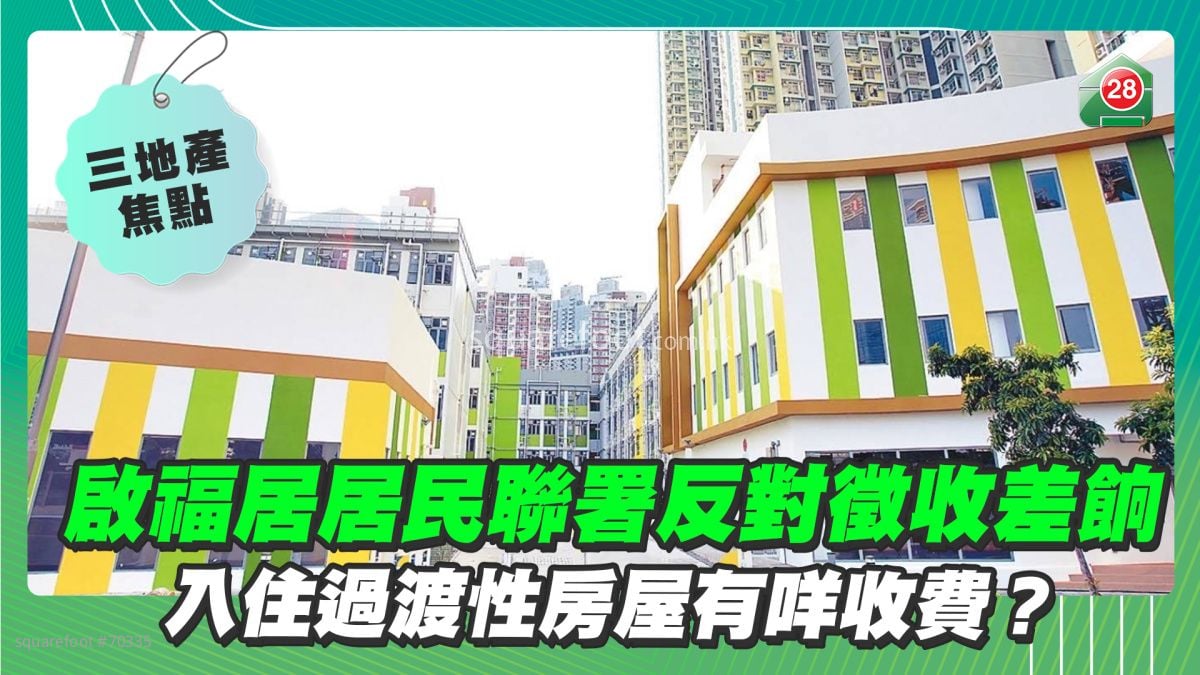- Home
- News
- Expert Blog
- Wed Property Focus
- Should Residents Of Transitional Housing Pay Rent?
The government has been promoting the development of transitional housing to address the issue of low-income families living in inadequate housing. However, the transitional housing project at Kai Tak (Kai Fook Kui), which began admitting residents in August last year, has faced backlash due to poor hygiene and power outages. Last month, around 180 residents signed a petition opposing the additional payment of rates.
The issue arose when some residents received letters from the Rating and Valuation Department, which detailed the rateable value of their units and indicated that rates would need to be paid. Many were caught off guard by this sudden notification. Subsequently, the operator of Kai Fook Kui clarified that rates are calculated starting from the move-in date, with two-person units requiring an average monthly payment of approximately HK$142.5 to HK$160.8.
Residents objected to this additional cost, arguing that another transitional housing project nearby, T-Loft@Kai Tak, does not require additional rates payments. For reference, the rent for a two-person unit at Kai Fook House is HK$4,400, with an additional HK$400 for management fees, while rates are charged separately. In contrast, T-Loft@Kai Tak charges HK$4,450 for a two-person unit, with both management fees and rates already included in the rent.
Rates are part of the government’s general revenue used to fund public services such as the police, fire services, education, and healthcare. All residents, directly or indirectly, benefit from these services.
Rates are paid quarterly in advance and are calculated by multiplying the rateable value of a property by a specified percentage. The rateable value is the estimated annual rental income a property could generate if leased on the valuation date. For residential properties, a progressive rate system applies, meaning the higher the rateable value, the higher the rate percentage.
When assessing the rateable value, the Rating and Valuation Department considers market rental values of similar properties in the same area, adjusted for factors such as size, location, facilities, build quality, and management standards. If the area has poor infrastructure, this will be reflected in the rental value and rateable value.
Both public and private housing are assessed using the same criteria. However, public and transitional housing projects are exempt from the progressive rates system, and rates are instead charged at a flat 5% of the rateable value.
Kai Fook Kui emphasized that all residents were informed of the rental and fee structure before moving in. The costs included in transitional housing rent vary depending on the operator’s management style, services, and facilities provided. Operators are required to clearly outline the breakdown of rental costs and fees when leasing the units.
The Housing Bureau added that rent for transitional housing typically includes basic management fees. However, some projects charge separate fees for management and rates, as well as utilities like electricity, water, and shared facilities. Management fees may also differ, with some operators charging a flat fee and others calculating fees based on the unit’s size. Residents are advised to fully understand the fee structure before moving in.
Like
| Property Type | Price | Ads Period |
|---|---|---|
| For Sale Property | ||
Normal Listing Typical One | HKD:1000 (or Hsemoney:1000) | Valid:90 days |
Golden Top Listing Higher position than Top listing 2-3times better performance | HKD:3000 (or Hsemoney:3000) | Valid:60 days |
| Rental Property | ||
Normal Listing Typical One | HKD:1000 (or Hsemoney:1000) | Valid:80 days |
Golden Top Listing Higher position than Top listing 2-3times better performance | HKD:3000 (or Hsemoney:3000) | Valid:60 days |
